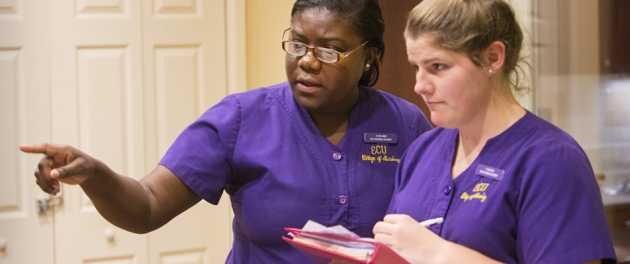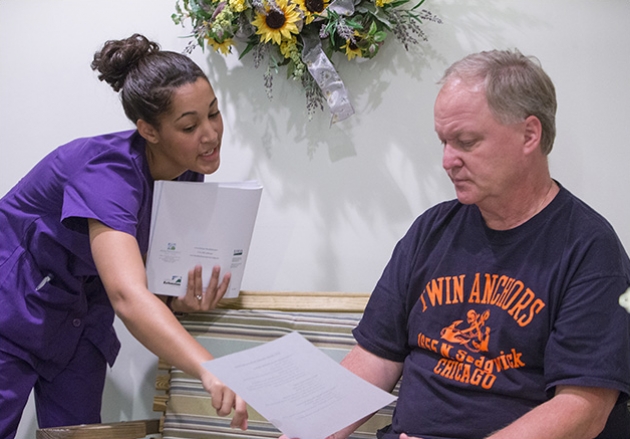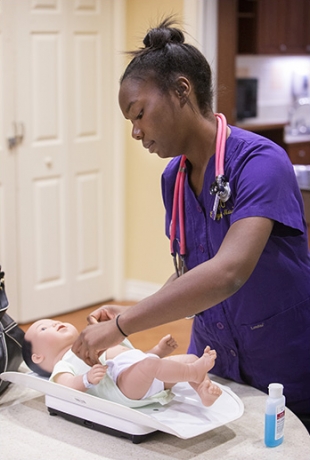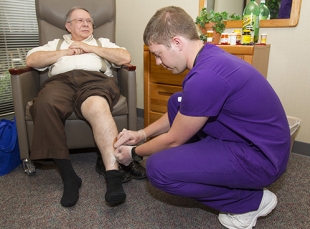Publisher's note: The author of this post, Kathryn Kennedy, is a contributor to ECU News Services.
Simulation trains students to care for patients outside clinical settings
Al Schreier rocked back in his recliner, surveying the three future Pirate nurses who filled his small apartment. They were there, they explained kindly, to follow up on an injury to Schreier's leg. He needed his bandage changed, and a general condition assessment.
He listened patiently for a while, nodding as they advised him to limit his smoking and refrain from drinking while on pain medication. But then something else crossed his mind.
"Have you seen my pet cobra?" he asked. "Or my lizard? Sometimes they escape from the terrarium."
Fortunately for the students, Schreier was not a real patient. The experience was part of a 45-minute simulation for seniors in East Carolina University's College of Nursing. The fake cockroaches and mice, empty wine bottles and bad habits of their mock patients were intended to convey the unique challenges associated with administering health care in a home setting.
 Simone Williams and Samantha Nelson, both seniors in ECU's College of Nursing, discuss their strategy for a mother-baby wellness checkup simulated during a recent home health exercise at Vidant Medical Center. The experience prepares nursing students for unexpected issues they may encounter if they are charged with visiting a patient at home. (Photos by Jay Clark)
Simone Williams and Samantha Nelson, both seniors in ECU's College of Nursing, discuss their strategy for a mother-baby wellness checkup simulated during a recent home health exercise at Vidant Medical Center. The experience prepares nursing students for unexpected issues they may encounter if they are charged with visiting a patient at home. (Photos by Jay Clark)
Students encountered three different care scenarios Sept. 10 – an adult patient on a small porch, Schreier in his mock apartment, and a mother and child wellness visit in a mobile home. Each was conducted in the Rehabilitation Center at Vidant Medical Center.
Morgan Hampton, a senior in the College of Nursing, examines a baby mannequin during a home health simulation exercise at Vidant Medical Center.
Simulation coordinator Jane Miles, an assistant professor in the College of Nursing, once worked as a home health nurse and knows firsthand how different a home visit can be from a clinical setting.
"You have to function very independently, be ready to respond to any situation," Miles said. "The information that you get initially may be very different than what you see when you get there."
She described how her first home health job in Hawaii was far from paradise. Miles encountered very poor living conditions, infestations, dogs and cats, and hostile or defensive patients and family members.
But as health care evolves, she said it's important that ECU nursing students have a grasp on many different models for delivering care.
Students emerging from their simulation lessons admitted to being distracted by some of the information provided by the actors, and by the setting.
"The trend and prediction as we try to save health care dollars is that we need more preventative care and to keep people out of the hospital," Miles said. "Nurses who can do (home health visits) are in high demand."
College of Nursing senior Bryan Duttman changes a bandage for Al Schreier, a volunteer serving as a patient in a recent home health simulation.
Home health and hospice nurses work exclusively in patient homes, but Miles said it is not unusual for nurses working in health departments or schools to also make home visits.
"I knew he would have issues and concerns, but the alcohol threw me off," said Brittany Locklear after meeting with a mock patient who claimed he drank three bottles of whiskey the night before.
"I wish we could have talked more about (his alcohol consumption)," added Sarah Long, who was in the same simulation group as Locklear. "I felt like we jumped around too much."
But there are also advantages, students said, in seeing a patient in their home environment.
"When (patients are) in the hospital, they're under a lot of stress," noted Gabe Pantoja. "But when they get home...they're more ready to learn. So you get to focus on education rather than acute care."
 College of Nursing senior Brittany Locklear gives health advice to Randy Parker, an professor in the Department of Economics at ECU who volunteered as a patient during a recent home health simulation.
College of Nursing senior Brittany Locklear gives health advice to Randy Parker, an professor in the Department of Economics at ECU who volunteered as a patient during a recent home health simulation.













 Simone Williams and Samantha Nelson, both seniors in ECU's College of Nursing, discuss their strategy for a mother-baby wellness checkup simulated during a recent home health exercise at Vidant Medical Center. The experience prepares nursing students for unexpected issues they may encounter if they are charged with visiting a patient at home. (Photos by Jay Clark)
Simone Williams and Samantha Nelson, both seniors in ECU's College of Nursing, discuss their strategy for a mother-baby wellness checkup simulated during a recent home health exercise at Vidant Medical Center. The experience prepares nursing students for unexpected issues they may encounter if they are charged with visiting a patient at home. (Photos by Jay Clark)


 College of Nursing senior Brittany Locklear gives health advice to Randy Parker, an professor in the Department of Economics at ECU who volunteered as a patient during a recent home health simulation.
College of Nursing senior Brittany Locklear gives health advice to Randy Parker, an professor in the Department of Economics at ECU who volunteered as a patient during a recent home health simulation.









